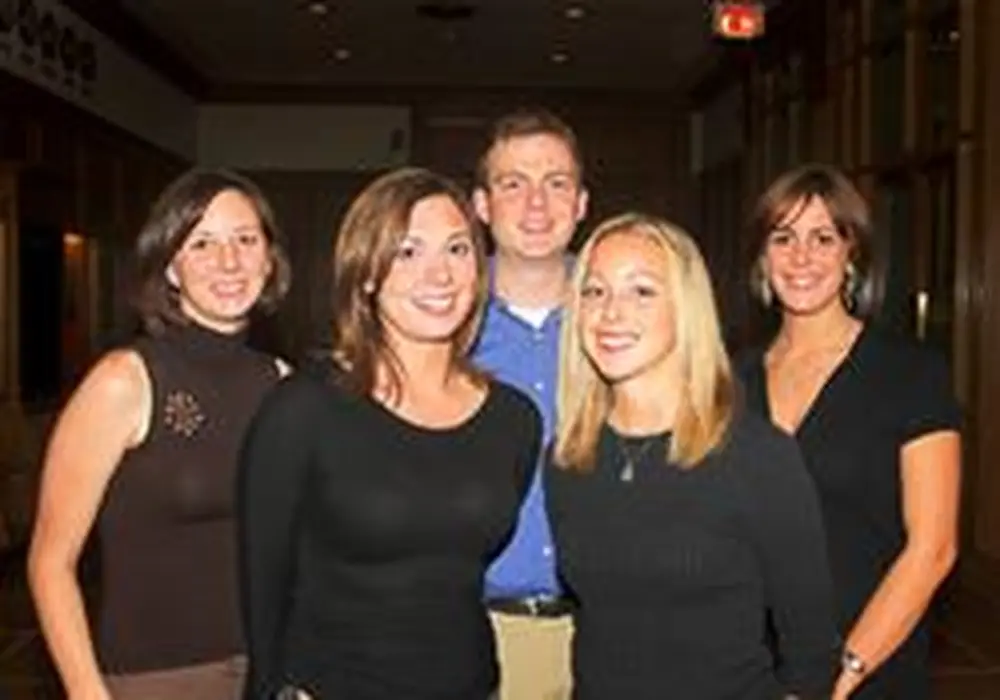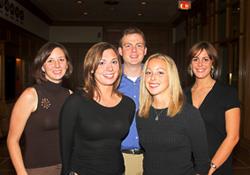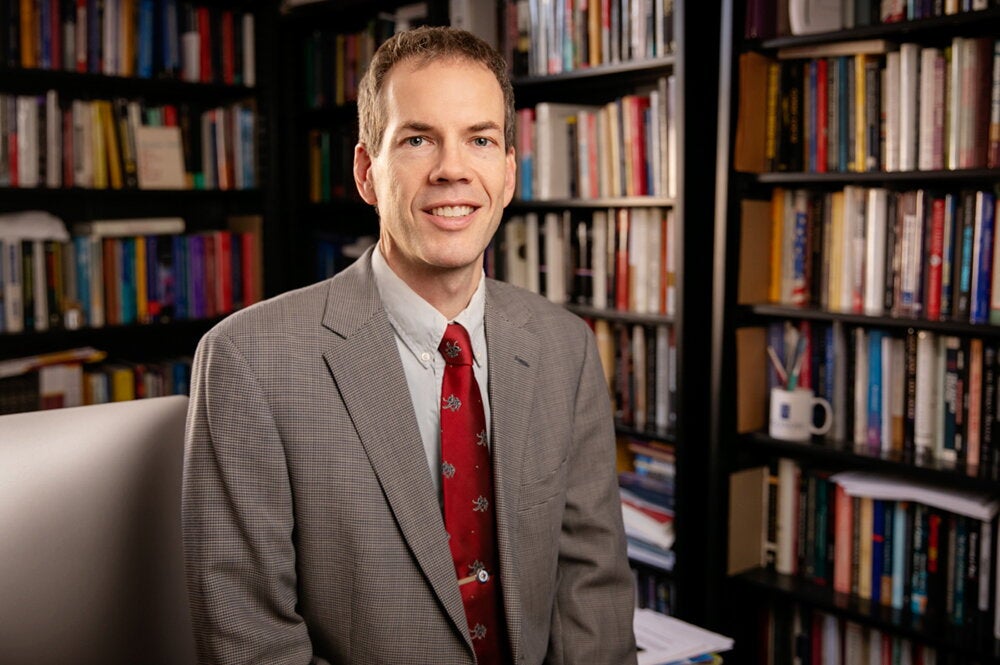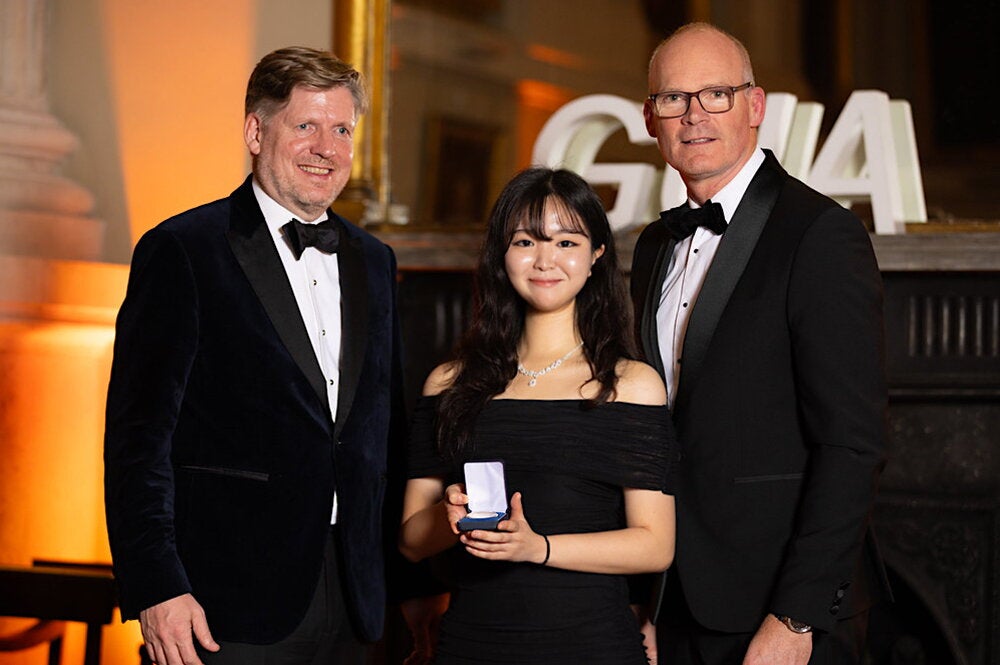

Spend an hour with the first five students designated as Civic Leadership Fellows at Illinois and any fears about the future-who's taking us into it and how-are doused.
For example, Kasey Umland, a graduate student from Monee, Illinois, wants to have a hand in restructuring the International Monetary Fund and the World Bank as a first step toward improving economic development around the world.
Andrea Alvarez, a 22-year-old senior from Geneva, Illinois, wants to leave the world a better place in three areas: the environment, national health care, and AIDS.
Emily Renwick, a 22-year-old graduate student from Champaign, is impacting politics as author of a chapter comparing local, state, and provincial politics in Canada, Mexico, and the United States. She plans to specialize in international law and human rights, and then use her foreign languages, her four study abroad experiences, and international contacts to work in the public or private sector.
Mark Brown, a 21-year-old senior, also from Champaign, wants to overhaul academia, making it more responsive to political and social challenges as trends in globalization continue to cut traditional blue-collar jobs.
And Merrin Permut, a 21-year-old senior who went to Glenbard West High School in Glen Ellyn, Illinois, dreams about running a company that holds itself to the highest standards. "I feel that businesses can set the tone. I would love to work for a company that shows society that a humanistic approach to business can work and should be valued."
Chosen a year ago through a rigorous competitive process, they have been to Chicago, where they toured the Criminal Courts Building, visited the North Lawndale College Preparatory Charter High School, met with an ambassador, attended an editorial board meeting of the Chicago Tribune, and a Chicago City Council hearing on slave reparation payments.
Then it was off to Washington, where they met the executive director of the International Women's Media Foundation, had a VIP tour of the Capitol, chatted with the No. 2 lawyer in the Commerce department, attended a Senate Judiciary Committee hearing on the Patriot Act, observed the House in session, and toured the White House.
And that was just part of their first semester in the Civic Leadership Program, developed by the Department of Political Science.
These five, and presumably the fellows who will follow them, are ably qualified to succeed on the national and international scene.
"In my mind," says James Nowlan, director of the CLP, "they are defined by their significant personal capacities and confidence to take their strong intellectual abilities and commitment to public service into the hurly-burly of the real world. In other words, these five have personal skills to match their intellectual skills, which is imperative for success in civic life."
Nowlan knows something about success in life-both civic and personal. A professor and senior fellow in the Institute of Government and Public Affairs, he has been a politician (elected to the Illinois House of Representatives in 1968 at the age of 26), and a senior aide to four Illinois governors (Ogilvie, Thompson, Edgar, and Ryan). He managed U.S. Sen. Charles Percy's successful campaign for re-election to the U.S. Senate in 1978, and the next year organized U.S. Rep. John B. Anderson's national campaign for the Republican nomination for president.
In addition, he is the author of several books about politics, including Inside State Government, considered by many to be required reading for executives in Illinois state government. He also is bringing out a second novel about American politics, public management, and social change.
Moreover, the U. of I.-educated (AB, MA, and PhD) professor publishes three weekly newspapers in Central Illinois and writes frequently for daily newspapers throughout Illinois and is a periodic columnist for Crain's Chicago Business and the Chicago Tribune.
And he spends a good deal of time trying to make the Illinois budget comprehensible to non-profit and citizen groups. Other titles: president and now member of Children and Family Research, and advisory board member of Civic Preservation of Chicago.
"Whenever I get kicked out of government and politics," Nowlan jokes, "I take refuge in IGPA and hope to bring with me knowledge and experience. And I gain faculty policy knowledge that I can take back to the political and governmental arena."
While he considers himself a jack of all trades, his fellows rightly call their wise, engaged, and well-connected leader their personal trainer.
What he gets in return is a job he loves.
"I find, belatedly, great satisfaction and warmth from basking in the reflected glow of the growth and accomplishments of my sharp students," he says.
"Having been knocked about a good deal in the world of politics proves of great value in my mentoring," he says. "This is also true for the lessons I learned in earlier years, which I now pass on to appreciative students. I think this is a reason my friends in important places now are so responsive when I invite them to come back to campus to offer the same to students."
Established in the fall of 2004, the Civic Leadership Program is a new initiative of the political science department's new Center for the Study of Democratic Governance. CLP was founded to generate a stream of highly motivated, broadly trained, ethically aware, and exceptionally skilled individuals who will be prepared to provide informed and capable leadership in civic affairs. In this case, civic affairs are defined broadly: to include political activities in both the public and private domains.
The students take courses in public policy, political economy, and ethics-courses designed to enhance their capacities to becomes leaders on the world stage, Nowlan says.
According to Nowlan, the program grew out of a shared concern among people on and off campus-including Peter Nardulli, head of political science, and alumnus Richard Cline-that the well of potential civic leaders was running dry.
Or put another way: "That in the near future, our nation may face a deficit of principled and talented men and women who are committed to civic leadership in a society where too many of us are bowling alone, rather than participating in the community and national groups that have to this point nurtured civic leadership," Nowlan says.
"While that situation wasn't the only reason for developing the program at Illinois, I think it worth noting that this campus has never had a graduate elected governor, let alone president, and only one U.S. senator from Illinois [Alan J. Dixon]," Nowlan says. "So, has this campus been doing enough to provide strong personalized support for undergraduates who have significant civic leadership potential and aspirations, maybe unrealized? I think not."
The initiative is part of a larger movement, Nowlan says, one spearheaded by the Carnegie Foundation for the Advancement of Teaching and endorsed by the American Political Science Association.
A significant element is that each student is paired with a designated senior fellow mentor with whom he or she shares common interests. The mentors are fairly accomplished and inspiring in their own right.
Among them are a former Illinois governor (Jim Edgar), a former chairman of the Chicago Federal Reserve Bank and former CEO of Nicor, Jewel Foods, and other Fortune 500 companies (Richard Cline), a former ambassador to Germany (J.D. Bindinagel), executive director of the International Center for Women in the Media (Lisa Woll), and former deputy director of the U.S. Office of Management and Budget (Daniel Kearney).
Student fellows complete bachelor's degrees in their desired fields, then leave campus in the second semester of their senior years for an internship, which can be done anywhere in the world. Then they return for a one-year master's degree in political science with a focus on civic leadership. In their master's program, fellows take part in a yearlong public-policy practicum that produces a published analysis with recommendations. A new crop of fellows, up to 15 students, will be recruited every fall.
This semester the two graduate students, Renwick and Umland, are receiving tuition waivers; Umland also works part-time as a teaching assistant. In the future, scholarships may become available for CLP student fellows. The program just recently received a $100,000 grant from the McCormick Tribune Foundation and lines are out to several donors who have expressed interest in supporting the program, Nowlan says.
Next year all of the internships will be paid and tuition waived. Some internship compensation will be paid by the employing agency or office or official, Nowlan says, while other internships will be supported by fellowships sponsored by Nicor and Pepsi as well as with support from the Samuel K. Gove Fund. Gove is director emeritus of IGPA and often referred to as Mr. Illinois because of his depth of knowledge about its politics.
"The objective," Nowlan says, "is to provide undergraduate scholarships and graduate fellowships from second semester junior year through the one-year master's program. We are working hard to fund the program fully."
The Civic Leaders pictured above are, from the left: Kasey Umland, Andrea Alvarez, Mark Brown, Emily Renwick, and Merrin Permut.
So, what is leadership in the twenty-first century, and can it be taught? According to James Nowlan, the director of the Civic Leadership Program, leadership is not the black-and-white of a generic grocery store product.
"It comes in many different packages and styles," he says. "A quality that is part of every different package, I think, is the capacity to grasp and understand a new task quickly, organize the resources, accomplish the task, and get the job done."
Nowlan says he believes that the Civic Leadership Program, and others in the "broad leadership genre," can, in fact, give young people the intellectual and social tools "and the resulting self-confidence to execute leadership qualities."
"Can we make Winston Churchills out of each? Could Winston Churchill himself have made his mark without World War II?" Nowlan asks. "After all, he had been moldering in the countryside for decades, ridiculed by politicians in London.
"In other words," Nowlan says, "unexpected situations often create opportunities for individuals to exhibit serious leadership. The Civic Leadership Program can prepare its fellows to seek out as well as react more effectively than they might have otherwise to challenging situations and opportunities."


